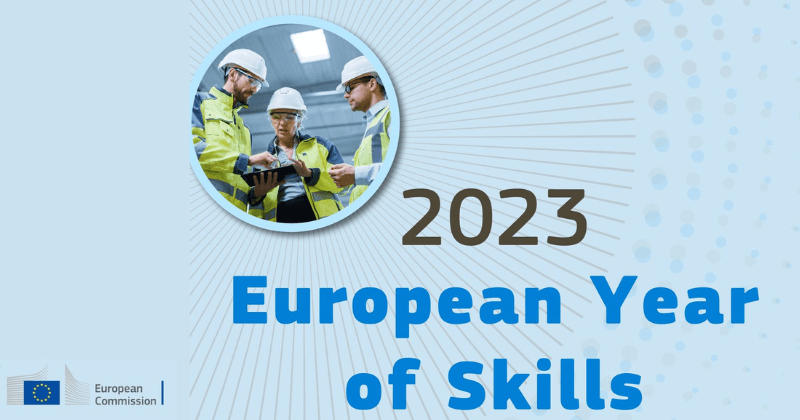2023 – The European Year of Skills

The European Union is launching the Year of Skills in 2023, with a focus on upgrading workforce skills across Europe to ensure that the EU can be competitive in world markets. This bold project brings together a range of strategies and resources that both employers and employees can access to develop their skillsets.
The EU’s goal is for Europeans to be able to develop the necessary skills for an ever-changing job market, which will require a combination of smart technology and accessible education. This program offers employers the opportunity find highly-skilled personnel, while workers have unprecedented access to advanced training opportunities to advance their careers and employment opportunities. The European Union is committed to providing its businesses and population with the expertise and information needed for them to succeed during the global energy and digital transitions. These initiatives are part of a comprehensive plan that will enable Europe’s population to reap the benefits associated with this progress.
The skills challenge
The latest Digital Economy and Society Index has demonstrated an alarming lack of digital skills across Europe, where 4 out of 10 adults are unable to meet the basic requirements needed for many job roles. These deficits have become increasingly important, as different occupations from construction to engineering, healthcare to IT, suffer from a severe labor shortage due to insufficient numbers of trained personnel. This demonstrates just how rapidly the economies and societies in Europe are changing and how much is demanded from those looking for new employment in the current climate. The challenge now lies in providing training opportunities and ensuring people are equipped with the current digital knowledge needed to succeed in a career.

Goal
Recognizing the importance of lifelong learning, the Member States of the European Union have announced their commitment to EU 2030 social goals. All Member States are planning to ensure that at least 60% of adults within their countries participate in some kind of training annually in order to reach this goal. The EU has set a target of ensuring that by 2030, 80% of all adults in Europe are digitally literate and have basic digital skills or higher. For example, they have also set a target of having 20 million employed Information and Communications Technology (ICT) specialists in the region.
Approach
The European Union is now committed to investing in skills development, providing a wide range of initiatives and assistance to support workers and employers. These include projects to help with job searches, training opportunities, and measures to create a more open and flexible labour market, as well as free online learning platforms accessible from anywhere. The EU also provides financial assistance for businesses to invest in employees’ skills and capabilities so they can take advantage of the benefits that come with being part of the European Union. This focus on gaining new skills shows that the EU is making sure its people are prepared for the challenges of today’s ever-changing world.
The initiatives
Here are just a few of the most important programs and funding initiatives within the European Year of Skills:
- The Pact for Skills with pledges to help 6 million people gain new skills.
- The Structured Dialogue on Digital Education and Skills.
- EU Talent Pool and Talent Partnerships to match candidates for work in Europe.
- The New European Innovation Agenda, to create the right framework conditions for European talents.
- The European strategy for universities to develop the future skills for a wide range of (lifelong) learners to develop creative and critical thinking.
- The Digital Skills and Jobs Platform offering information and resources for digital skills such as self-assessment tooling.
- The Digital Skills and Jobs Coalition promoting training in digital skills.
- The European Social Fund Plus (€99 billion over 6 years)
- The Recovery and Resilience Facility supporting reforms and investments in the area of skills and jobs.
- The Digital Europe Programme’s (€580 million) to develop digital skills.
- Marie Skłodowska-Curie Actions, the European Innovation Council and the European Institute for Technology for innovators and researchers.
- Erasmus+ (€26 billion) for student development and education and training institutions.
EU collaboration and commitment
The 2023 Year of Skills proposal is a collaborative effort between the European Commission, the European Parliament and the European Council. It is a clear sign of the European Union’s commitment to providing training and education opportunities that will help people develop skills, increase employment prospects and become more competitive in the workforce. By successfully executing these initiatives, a powerful workforce will be created that is prepared to tackle the global issues of our ever-evolving world – ultimately improving both established and upcoming European businesses.
Further reading
The 2022 State of the Union address by the European President von der Leyen proposing the 2023 European Year of Skills.
The European Skills Agenda
